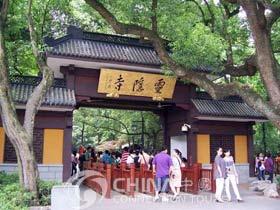 Lingyin Temple, or "Soul's Retreat Temple", is the most influential temple in South China, and is regarded as one of the 10 famous Buddhist temples in China. In its peak periods, tens of thousands of pilgrims came here every day. The temple was built in 326 AD when the Indian monk Huili arrived at the Peak Flown From Afar and, finding that the Peak was so outstanding and beautiful that he thought it was a retreat of supernatural beings. So he built the temple and gave it the name of Lingyin. The main hall in Lingyin Temple is about 34 meters (111ft) tall - incredibly high for a one-story building. In the center of the hall there is a statue of Sakyamuni Buddha with 24.8 meters high, which was carved from 24 pieces of camphor wood, and is the biggest wooden sitting Buddha in China. The two stone pagodas in front of the hall were built in 960 during the Song dynasty (960-1271). The Mahayana Hall of Lingyin Monastery houses China's largest wooden sculpture of the Sleeping Buddha, which stands 9.1 meters in height, including the lotus seat and the top of Buddhist Glory, the entire statue measures 19.6 meters in height.
Lingyin Temple, or "Soul's Retreat Temple", is the most influential temple in South China, and is regarded as one of the 10 famous Buddhist temples in China. In its peak periods, tens of thousands of pilgrims came here every day. The temple was built in 326 AD when the Indian monk Huili arrived at the Peak Flown From Afar and, finding that the Peak was so outstanding and beautiful that he thought it was a retreat of supernatural beings. So he built the temple and gave it the name of Lingyin. The main hall in Lingyin Temple is about 34 meters (111ft) tall - incredibly high for a one-story building. In the center of the hall there is a statue of Sakyamuni Buddha with 24.8 meters high, which was carved from 24 pieces of camphor wood, and is the biggest wooden sitting Buddha in China. The two stone pagodas in front of the hall were built in 960 during the Song dynasty (960-1271). The Mahayana Hall of Lingyin Monastery houses China's largest wooden sculpture of the Sleeping Buddha, which stands 9.1 meters in height, including the lotus seat and the top of Buddhist Glory, the entire statue measures 19.6 meters in height.
The temple has been destroyed 16 times in its long and checkered history. The Great Hall is a mix of late Qing and early Yuan Dynasty relics, with a few more recent additions too. And now, it is very much a working monastery. The temple is located in a long, narrow valley between two peaks. A red wall in the middle of the valley seems to lengthen the distance, adding to the mystery of the monastery, which seems to be hidden; hence the name, the "Monastery of Sole's Retreat".
